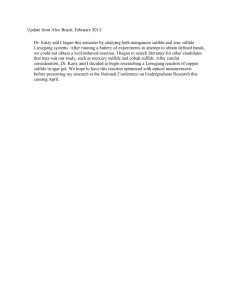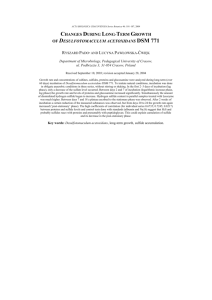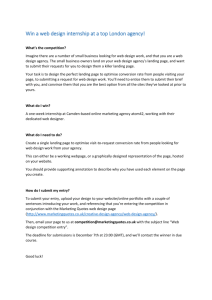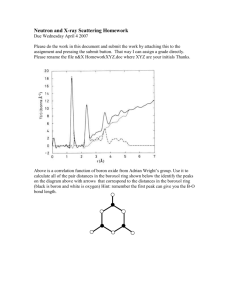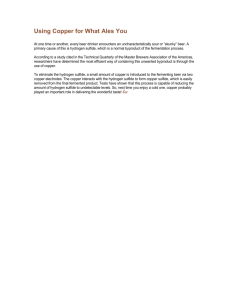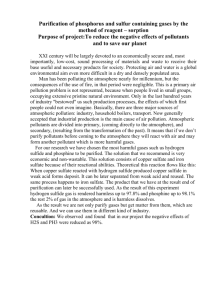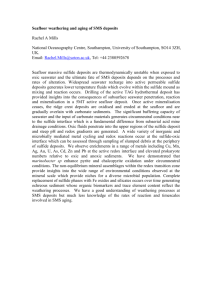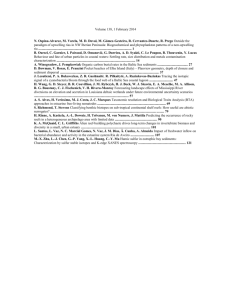the presentation slides
advertisement
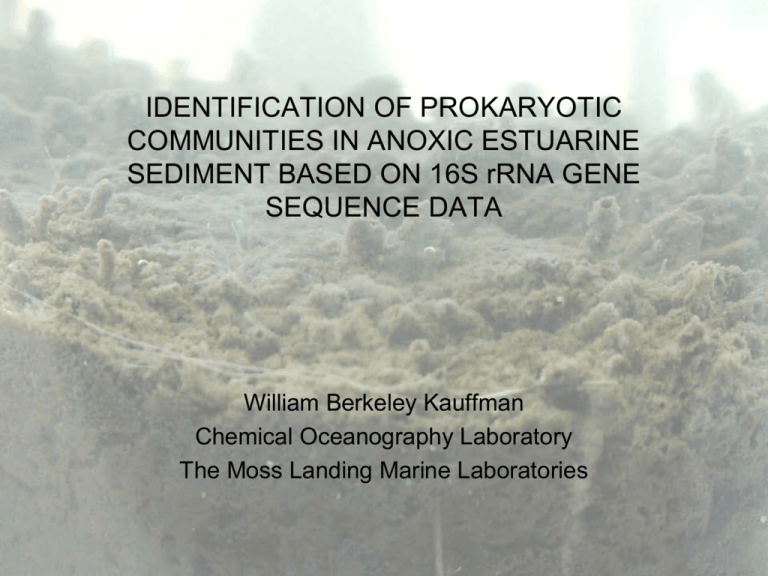
IDENTIFICATION OF PROKARYOTIC COMMUNITIES IN ANOXIC ESTUARINE SEDIMENT BASED ON 16S rRNA GENE SEQUENCE DATA William Berkeley Kauffman Chemical Oceanography Laboratory The Moss Landing Marine Laboratories THE BLACK BOX Input Residence Time(d) Input Reservoir (g) Flux (g/d) Output Eukaryota www-rohan.sdsu.edu www-rohan.sdsu.edu Metabolic Plasticity upload.wikimedia.org Prokaryotes Eukaryotes www.esf.edu Goals • Identify geochemical gradients in Hudson’s Landing sediments using multiple proxies • Identify members of the prokaryotic consortia along these gradients using molecular methods • Address the hypothesis that prokaryotes are distributed across these gradients in a regular and predictable manner • Discuss implications for managed estuaries SEDIMENT SURFACE Tubeworm Hydrogen Sulfide Bubbles Tubeworm Burrow Oxidation-Reduction Potential and pH Increasing Dissolved Recalcitrant Material With Depth Carbon Data POC/N Negatively Correlated with C:N POC:N Positively Correlated With C:N Carbon:Nitrogen Blue Bar- C:N characteristic of autochthonous carbon (algae) Green Bar- C:N characteristic of allochthonous carbon (external carbon sources) Redfield Ratio 6.6 20 2.6cm Cellulosic Material Isthmia Chaetoceros Minerals 126 cm Cymbella Cocconeis Navicula Rhabdonema Navicula Peat? DGGE Results A. Raw Image B. All Bands Highlighted C. Excised Bands Highlighted SEDIMENT COLUMN Sulfate Reducers Sulfide Oxidizers SEDIMENT COLUMN Methanogens Methanotrophs SEDIMENT COLUMN Fermenters Reduce H+ Methanogens Oxidize H2 (g) The Shift • Proteobacteria dominate surface • Degradation of macromolecules • Denitrifying bacteria • Metal Reducers • Sulfate Reduction • Sulfide Oxidation • Methanogenesis/ Methanotrophy The Shift • Fermenters dominate the deep • Increased degradation of recalcitrant organics • Sulfate Reduction • Sulfide Oxidation • Methanogenesis/ Methanotrophy Estuarine Management • Syntrophic relationships not typically considered Estuarine Management • Syntrophic relationships not typically considered • At Hudson’s Landing, any change resulting in anoxic bottom conditions will effect nitrification rates Estuarine Management • Syntrophic relationships not typically considered • At Hudson’s Landing, any change resulting in anoxic bottom conditions will effect nitrification rates • Methanotrophic bacteria and archaea limit release of methane (greenhouse gas) to the atmosphere Estuarine Management • Syntrophic relationships not typically considered • At Hudson’s Landing, any change resulting in anoxic bottom conditions will effect nitrification rates • Methanotrophic bacteria and archaea limit release of methane (greenhouse gas) to the atmosphere • Sulfide oxidizing prokaryotes limit flux of toxic hydrogen sulfide into water column Estuarine Management • Syntrophic relationships not typically considered • At Hudson’s Landing, any change resulting in anoxic bottom conditions will effect nitrification rates • Methanotrophic bacteria and archaea limit release of methane (greenhouse gas) to the atmosphere • Sulfide oxidizing prokaryotes limit flux of toxic hydrogen sulfide into water column • Mercury methylation tied to iron/ sulfate reducing communities (Kerin et al. 2006) Estuarine Management • Syntrophic relationships not typically considered • At Hudson’s Landing, any change resulting in anoxic bottom conditions will effect nitrification rates • Methanotrophic bacteria and archaea limit release of methane (greenhouse gas) to the atmosphere • Sulfide oxidizing prokaryotes limit flux of toxic hydrogen sulfide into water column • Mercury methylation tied to iron/ sulfate reducing communities (Kerin et al. 2006) • Management plans should consider microbial consortia in an effort to maximize beneficial processes while minimizing those that are detrimental THE END Thank You- Any Questions? Funding Sources: Harvey Research Fellowship- San Jose State University Dr Earl H. Myers and Ethel M. Myers Oceanographic/Marine Biology Grant ACKNOWLEDGEMENTS • • • • • • Committee- Kenneth Coale, Sabine Rech, Ivano Aiello, Jeff Hughey Personal- Deborah Coffin, Rebecca and Kyhber, Danny, Lorie, Temple, Chem Oce/ Trace Metals- Sara Tanner, Craig Hunter, Jason Smith, Liz Sassone, Jocelyn Douglas, Wes Heim, Allan Andrews, John Negrey, Adam Newman I.T. Department Environmental Microbiology Lab @ SJSU- Elaine Bryant, Paula Mattheus, Cleber Ouverney Small Boats- JD, Scott Hansen, Lee Bradford • • • • Research Help- Jon Walsh, Max OC, Cassandra Brooks, Liz Sassone, Brent Hughes, John Haskins, Paul Chua, Rhea Sanders, Brian Bender, Brian Deiter Geo Oce, Benthic Lab, Invert Zoology Classes-Geo Oce (Ivano), Chem Oce (Kenneth), Stats (Jim), Molecular methods (Jon), Methods (Jim and Mike) Facilities, etc.- Joan Parker and library staff, May Deluna, Ashley Vizurraga, John Machado, Donna Kline, Barry Giles, Gary Adams, Lynn McMasters, James, Billy, and Ralph (crawfish cooker!)
